Scarborough is BBC One's new series from Derren Litten, the creator and writer of hit comedy Benidorm. We caught up with Derren to find out about his writing life, the development of the show and to share any advice for other budding comedy writers. Scarborough continues on BBC One on Fridays at 9.30pm or catch up on BBC iPlayer.
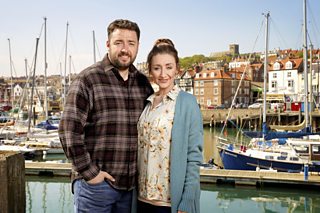
Mike (JASON MANFORD), Karen (CATHERINE TYLDESLEY) in Scarborough (Image Credit: BBC/Kieron McCarron)
You began your career as an actor. When did you first start writing? Did it come out of writing material to perform yourself?
I was first asked to write by my best friend from drama school (The Central School of Speech and Drama), she had booked to do a show at the Edinburgh Fringe but hadn’t finished writing her show; in fact I’m not sure she had started it. I wrote some sketches for that show even though I had absolutely no experience; I watched an awful lot of TV comedy when I was a kid so I guess that was my training (plus I had been a working actor for 10 years at that point. Oh, that friend was Catherine Tate.
Following the Catherine Tate show you went on to write Benidorm which ran for 10 series on ITV. What do you think was the secret of Benidorm’s success?
I genuinely think, and this is not false modesty, one of the secrets of its success was that I didn’t have a clue what I was doing. I wrote a twenty two and a half minute show with fifteen characters in it. It was in the green room at a recording of The Catherine Tate Show that producer Geoffrey Perkins asked me to write my “own show”; that was it, no other criteria; he gave me a half hour ‘blank’ commission. To prove further that I didn’t know what I was doing my first script was 60 pages. I think the other reason it was a success is that Paul Jackson, the then head of comedy at ITV just let us get on with it, he commissioned it on the strength of two scripts with no cast attached, no table reads, no big stars; that would be unheard of these days.
Watch the trailer for Scarborough
How would you describe the tone of your new show Scarborough?
I tried to write a comedy soap. I’m not sure if I succeeded but I knew I wanted an entirely different tone from Benidorm. Benidorm ended up rather more broad than the first series but if it hadn’t it wouldn’t have run for 10 years. With Benidorm I would feel sick if I didn’t have four gags per page, with Scarborough I concentrated on the characters and their relationships and tried to let the funny lines come from that; I actually took out several jokes per episode until I got into the new feel of the show.
You’ve described it as a ‘comedy soap’. What does that mean and were there any particular influences?
Well, I’ve described it as a comedy soap but here’s my confession, I don’t watch soaps. But I do remember stuff like old school Coronation Street from the late 70’s and early 1980’s, relationships like Alec and Bet Gilroy and Stan and Hilda Ogden. There’s a famous scene with Stan and Hilda on their second honeymoon where Hilda tells Stan to give her a kiss, once he’s recovered from the shock he obliges then asks, “what does that lipstick taste of?”, Hilda’s reply of “woman Stanley, woman!” is laugh out loud funny but it’s also so beautiful. If I can achieve anything remotely close to that in Scarborough then I think as a writer I’ve succeeded.
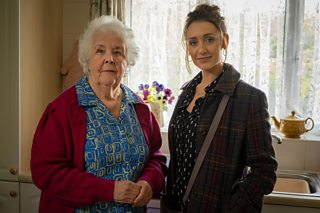
Marion (STEPHANIE COLE), Karen (CATHERINE TYLDESLEY) in Scarborough (Image Credit: BBC/Matt Squire
What was the commissioning process? Had you already written a first episode script or did you pitch an idea?
It was quite long. I’ve been incredibly lucky with my writing, people have literally asked me to write whatever I want and it’s been made - I think after 12 years of being a television writer I got my first taste of the real world. On this occasion I wrote a one off tribute to Are You Being Served for the BBC and James Farrell (BBC Studios Comedy Head of Development) and Stephen McCrum (then BBC producer) asked me to write a studio sitcom. I asked James not to commission a script yet as I didn’t want to feel pressured. I wrestled with the idea for a while but I couldn’t get into it, I didn’t like the characters or the premise and just as I was struggling with it the next series of Benidorm (series 10) came around so it all had to go on the back burner.
After Benidorm series 10 I went back to my script, which at that point had no title, read through it, put it in the bin (metaphorically, it’s still lurking somewhere in the deepest recesses of my MacBook) and just started again forgetting about the studio sitcom brief. I called the first script Scarborough and we cast some actors and did a table read. We then changed a couple of the actors and did another table read a couple months after that (at the BBC’s request). From this we were given a (small) budget to make a pilot. We shot the pilot (with James Farrell producing and Stephen McCrum exec’ing via Chris Sussman for BBC Studios) then there was quite a long gap, of a few months, I was writing then rehearsing the stage tour of Benidorm Live so it’s not like I was waiting by the telephone. Eventually I was told the BBC wanted a six part series and then we had another couple of casting tweaks (where I cast myself as the landlord of the pub; a difficult decision as I was also directing) before we were all set to film on location in Manchester & Scarborough March/April 2019.
Why did you locate the story in Scarborough, and how important is that particular sense of place?
I wanted a village or a small town where gossip could circulate quickly, a close community with a beautiful backdrop. Scarborough came to mind immediately as I am from East Yorkshire and had many, many day trips to Scarborough as a kid.
How did you come up with your main characters for Scarborough? Do you think of your characters before the story?
I knew I wanted a realistic love story, by that I mean a bit of love and an awful lot of coping (for want of a better word). I was interested in (for our hero couple) themes of approaching 40, the chance of revisiting an old relationship and thinking, “is it really better the devil you know?” Obviously there are other themes too with regards to the other characters but I wanted this to be the central theme within an ensemble show.
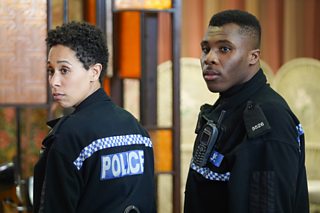
WPC Treeves (REBECCA SCROGGS), PC Merrick (OLISA ODELE) in Scarborough (Image Credit: BBC/Kieron McCarron)
Is the comedy intrinsic to each character? Were you influenced in your writing by knowing who had been cast in each role?
Yes, I think so. Although I didn’t worry if certain characters weren’t that funny. The character of Karen is quite ’straight’ but having a brilliant actress like Catherine Tyldsley who is equally at home with comedy and drama was amazing as most of her laughs come from beautiful, subtle reactions. There’s a scene in episode 2 where her and her mother are being interviewed by the police, Catherine’s reactions are amazing. Characters like this legitimise having slightly bigger characters; if a character is doing something inappropriate, offbeat or bizarre I think you can only get away with it if another character is taking the place of the audience and reacting in the way people would. If you don’t have that then you are in a world where crazy people are the norm, I’ve never wanted that, not even in Benidorm.
Casting Steve Edge as Jason Manford’s best mate came quite late and proved invaluable, one because he actually is Jason’s best mate and I worked with Steve in Benidorm for 3 years and knew I didn’t have to over write his character, Steve is a genius of subtle comedy acting. Talking of geniuses, it very quickly became clear what Stephanie Cole was capable of doing; that is, absolutely anything.
What were your favourite comedy shows when you were growing up?
The sitcoms I grew up with were Rising Damp, Porridge, Are You Being Served, To The Manor Born, The Good Life, George & Mildred, Robins Nest, Only When I Laugh, Duty Free, Fawlty Towers, Steptoe and Son, Some Mothers Do ‘Ave ‘Em, Hi-de-Hi, Only Fools and Horses, On The Buses, It ‘Aint ‘Alf Hot Mum and from the US, Different Strokes, Benson, Taxi, Mork and Mindy, Soap, Happy Days. And I made that list without googling them; I watched a lot of telly when I was a kid.
Have they been a big influence on you? Do you see your work fitting into a comedy tradition? A particular British sense of humour?
Yes, I’d say those comedies and stuff like Victoria Wood, Alan Bennett, The Carry Ons and Mel Brooks have all been an influence. Many critics have said my comedy is old fashioned, maybe it is if trying to make people laugh is old fashioned. Ben Elton’s Ronnie Barker lecture said it all for me, I have his quote, “It might help if commentator, critic and columnist alike would stop treating studio sitcom with such thoughtless contempt. As if the only comic art of real value is the comedy which pretends it isn't trying to be funny“ stuck on a post-it note on my computer. About 4 feet away from a framed copy of the infamous Ian Main/Fawlty Towers BBC memo (given to me by Geoffrey Perkins).
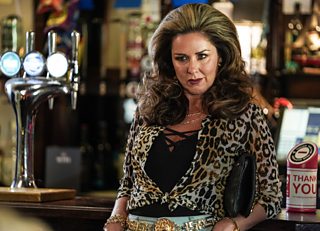
Hayley Cox (CLAIRE SWEENEY) in Scarborough (Image Credit: BBC/Kieron McCarron)
Do you have any tips for other budding comedy writers or is there anything you know now that you wish you’d known when you started writing?
As I suggested before, my entry into writing television comedy was via the side door, I don’t apologise for that but I do realise it doesn’t give me years of wisdom on how to get started, “go to drama school with Catherine Tate” probably isn’t going to help anyone. What I would say is don’t write for anyone but yourself. Don’t try to write the new Fleabag, don’t try to write the new Benidorm, take as much time as you want to write what you want to write about; this is also terrible advice because commissioners do want the new Fleabag, they do want the new Benidorm but if you write those you’re throwing your work onto a massive pile of other scripts who are trying to do the same thing.
On actually physically writing day to day (or night to night, obviously giving up a ‘regular; job to start writing is just foolish) I would say ‘free your mind’; by that I don’t mean take lots of drugs, I mean don’t feel restricted. Don’t think “that’s too many characters”, “how would they film an earthquake?”, “is two helicopters too much”, tell your story the way you want to tell it; you can always adapt it later when your producer is presented with the budget. My last advice would be if you do get a script commissioned and made do to not engage in “social" media, it is a virus of modern times and a swirling cesspit of negativity. If you do manage to do this please tell me how.
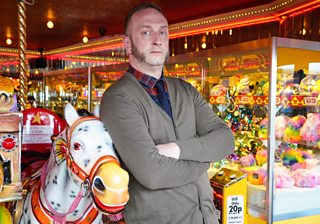
Bigsy (STEVE EDGE) in Scarborough (Image Credit: BBC/Kieron McCarron)
What do you think of comedy in general at the moment, and television comedy in particular? What are your favourites at the moment and why?
I live half of the year in Spain and although we have British TV I don’t watch much. I tend to watch the same things over and over again. I watch the movie The Sting and it makes me cry, not because 1930’s con men is a particularly emotive subject but because the script is so perfect. There’s some advice, if you want an example of the perfect script watch The Sting.
I love documentaries; the BBC Two documentary Three Salons At The Seaside was a huge influence on the hair salon in Scarborough (both in content and how it is shot by director Philippa Lowthorpe). A lot of comedies in the last few years which have been critically acclaimed I just haven’t liked; I didn’t hate them they’re just ’not for me’. If I had to pick recent comedies that have made me laugh I’d say Two Doors Down, This Country (and Scarborough, I did say write for yourself…).
Watch Scarborough on BBC One on Fridays at 9.30pm and on BBC iPlayer
